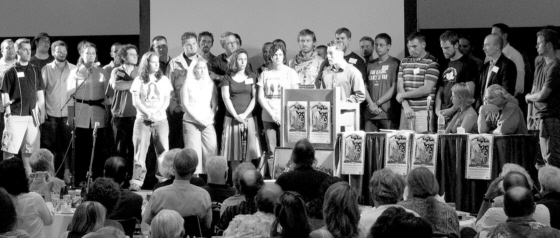|
||||
|
|
|
|||
| Home | Subscribe | Back Issues | The Organization | Volunteer | Do Something | ||||
|
||||
|
Defending Free Speech Rights of Lt. Ehren WatadaBrief filed for Fort Lewis officer facing court martial for opposition to Iraq Warfrom the ACLU of WA In a military justice case that has drawn wide attention, the American Civil Liberties Union of Washington is backing the free speech rights of a soldier facing court martial for refusing to serve in the war in Iraq. The ACLU recently submitted a friend-of-the-court brief contending that Lt. Ehren Watada-who is based in Fort Lewis, WA-should not be punished for his public statements expressing legal and moral objections to the war in Iraq. "Soldiers should not be court-martialed for explaining their views on important political issues when doing so does not adversely affect military functioning. Lt. Watada was exercising his free speech rights as a citizen in a democratic society," said Kathleen Taylor, Executive Director of the ACLU of Washington. Ehren Watada enlisted in the army after finishing college because he wanted to aid his country after the September 11 terrorist attacks. He has been deployed in Afghanistan and Korea, and has received good reviews for his service. Lt. Watada became convinced that the war in Iraq is unlawful and that he has a duty as an officer not to participate in it. When he learned that his unit was to be deployed to Iraq, he made requests to be transferred elsewhere, but they were denied. In early June, he discussed his views on the war publicly, holding a press conference and speaking to individual reporters. On June 22, he refused to board the bus for his deployment to Iraq. In addition to charges against Lt. Watada for refusal to report to duty, the military is seeking to penalize Lt. Watada for statements he made to reporters expressing his objections to the United States' involvement in the war in Iraq. The following are the statements for which Lt. Watada is facing court martial. Statement 1: "I could never conceive of our leader betraying the trust we had in him …. As I read about the level of deception the Bush administration used to initiate and process this war, I was shocked. I became ashamed of wearing the uniform. How can we wear something with such a time-honored tradition, knowing we waged war based on a misrepresentation and lies? It was a betrayal of the trust of the American people. And these lies were a betrayal of the trust of the military and the Soldiers.... But I felt there was nothing to be done, and this administration was just continually violating the law to serve their purpose, and there was nothing to stop them….Realizing the President is taking us into a war that he misled us about has broken that bond of trust that we had. If the President can betray my trust, it's time for me to evaluate what he's telling me to do."
Statement 2: "I was shocked and at the same time ashamed that Bush had planned to invade Iraq before the 9/11 attacks. How could I wear this [honorable] uniform now knowing we invaded a country for a lie?" Statement 3: "It is my conclusion as an officer of the Armed Forces that the war in Iraq is not only morally wrong but a horrible breach of American law.... As the order to take part in an illegal act is ultimately unlawful as well, I must as an officer of honor and integrity refuse that order.... The wholesale slaughter and mistreatment of Iraqis is not only a terrible and moral injustice, but it's a contradiction to the Army's own law of land warfare. My participation would make me party to war crimes." The Army charges that the Statements 1 and 2 violated Art. 88 of the Uniform Code of Military Justice ("Contempt Toward Officials") and that all three statements violated Art. 133 ("Conduct Unbecoming an Officer and Gentleman"). ACLU-WA Staff Attorney Aaron Caplan wrote the amicus brief. |
|

